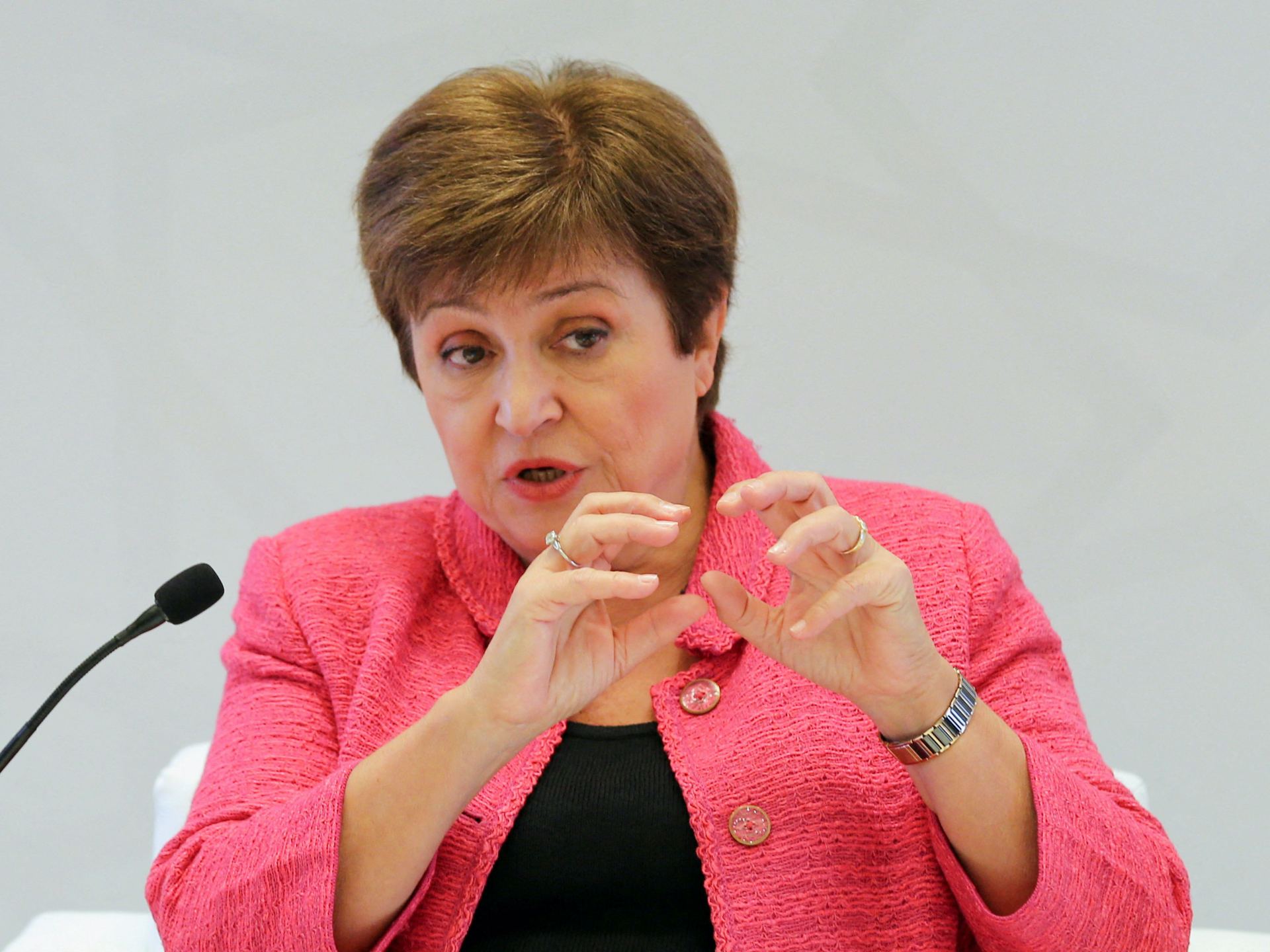IMF Chief Kristalina Georgieva Urges Pakistan To Take Steps Towards Economic Stability.
IMF chief Kristalina Georgieva stated that Pakistan must take decisive action to avoid going into a "hazardous zone" where its debt needs to be restructured in an interview with the German public broadcaster Deutsche Welle on the fringes of the Munich Security Conference on Friday.

IMF Chief Kristalina Georgieva Urges Pakistan To Take Steps Towards Economic Stability
According to the International Monetary Fund, cash-strapped Pakistan should guarantee that its rich incomes pay taxes and that only the poor receive subsidies if it wishes to function as a nation.
Kristalina Georgieva, the head of the International Monetary Fund (IMF), has encouraged Pakistan to take steps towards economic stability by raising tax revenues and allocating assistance solely to those who genuinely need them. Georgieva made these remarks while recently visiting Pakistan, where she underlined the significance of the nation’s economic growth.
Georgieva emphasized the need for Pakistan to act as a nation by taking steps to increase tax collections in her speech. She insisted on the significance of wealthy individuals contributing to the economy, whether they work in the public or private sector. This would increase revenue and lead to a more equitable allocation of that revenue.
IMF chief Kristalina Georgieva stated that Pakistan must take decisive action to avoid going into a “hazardous zone” where its debt needs to be restructured in an interview with the German public broadcaster Deutsche Welle on the fringes of the Munich Security Conference on Friday.
According to her, the IMF was obvious that it wanted to safeguard Pakistan’s poor, as the Dawn newspaper stated, and that it shouldn’t be the case that the wealthy receive subsidies. The impoverished ought to gain from them, she claimed.
She said Pakistan must take the necessary actions to operate as a country and prevent itself from finding itself in a dangerous scenario where its debt needs to be restructured. She claimed that one-third of Pakistan’s population was impacted by flash floods last year, which completely destroyed the country.
“We are emphasizing two things, and I want to emphasize that. The first is tax receipts. Those who can and those who are earning well in the public or private sector should make an effort to boost the economy.
“Second, to distribute pressures more fairly by directing subsidies only to those who genuinely require them. The wealthy should not be receiving handouts, she argued.
Days after the two parties ended the ninth assessment of the $6.5 billion bailout package without reaching a staff-level understanding, the IMF chief made his comments. Nonetheless, all parties concurred on several measures that might yet be used to seal the deal.
Pakistan has already received financial aid from the IMF and is currently in talks with the organization to renew its loan programme. Pakistan is in desperate need of money as it fights a searing economic crisis.
Around $1.1 billion would be released if the ninth evaluation of the programme could be agreed upon. Resuming the IMF programme will also open up new finance options for Pakistan. The State Bank of Pakistan‘s foreign exchange holdings has decreased to just $3 billion, which is hardly enough to finance three weeks’ worth of restricted imports.

The IMF had announced that “virtual conversations will continue in the next days to settle the implementation details” of the policies, including the tax measures, reached in Islamabad. Both parties have agreed to continue discussing.
To put the tax reforms into effect and come to an agreement with the IMF, the government is working against the clock. Pakistan has until March 1 to follow all of the IMF’s recommendations.
The International Monetary Fund is a global financial institution that works towards promoting international economic cooperation and monetary stability. One of its key roles is providing financial assistance to member countries experiencing economic difficulties.
Kristalina Georgieva urged Pakistan to take steps towards economic sustainability by implementing two critical measures: increasing tax revenues and re-distributing subsidies.
The Importance of Tax Revenues
One of the critical steps towards economic sustainability is increasing tax revenues. In Pakistan, the tax-to-GDP ratio is one of the lowest in the world, which means that the country is not generating sufficient tax revenue to fund its public expenditures. The IMF chief emphasized that those who can afford to pay taxes, whether in the public or private sector, must contribute to the economy.
Increasing tax revenues will help Pakistan reduce its fiscal deficit, which is the gap between government spending and revenue. The fiscal deficit has been a significant challenge for Pakistan over the years, and it has been financed by borrowing from international financial institutions like the IMF. However, borrowing is not a sustainable solution, as it increases the country’s debt burden, which can lead to future economic challenges.
The Need for Fairer Distribution of Subsidies

The IMF chief also emphasized the need for a fairer distribution of subsidies. In Pakistan, subsidies are provided for various goods and services, such as fuel, electricity, and food items.
However, the current subsidy system is inefficient, as it benefits the wealthy more than the poor. By re-distributing subsidies towards the people who need them the most, Pakistan can reduce its subsidy bill and save money that can be used to fund other public expenditures.
Moving subsidies towards the people who need them the most is also a critical step towards reducing poverty and promoting economic growth. When subsidies are targeted towards the poor, it helps to reduce the cost of living and increase purchasing power, which can lead to increased economic activity. This, in turn, can help to reduce poverty and promote sustainable economic growth.
Conclusion
The IMF chief’s call for Pakistan to take steps towards economic sustainability is critical, as it highlights the challenges that the country is facing in terms of generating revenue and managing public expenditure.
By increasing tax revenues and re-distributing subsidies, Pakistan can reduce its fiscal deficit, promote economic growth, and reduce poverty. However, implementing these measures will not be easy, as it requires political will, institutional capacity, and public support.
Nevertheless, the benefits of implementing these measures far outweigh the costs, and Pakistan can emerge as a stronger and more resilient economy by taking these steps towards economic sustainability.
Edited by Prakriti Arora




